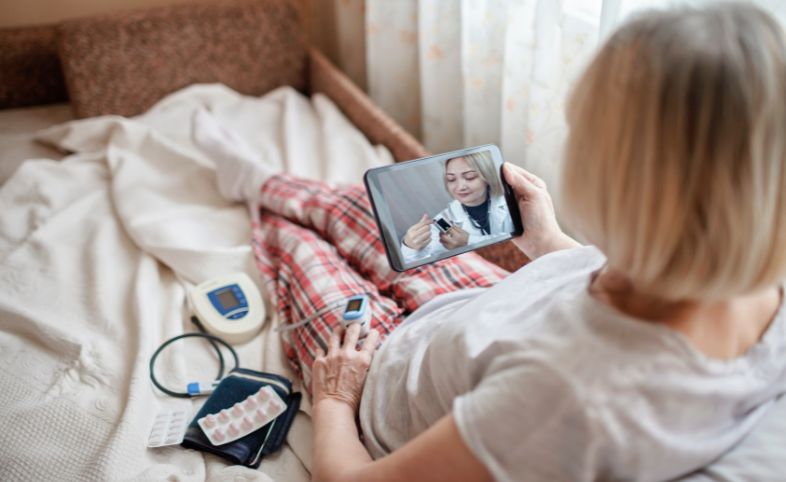The NHS Insights Prioritisation Programme (NIPP), a joint initiative of the Accelerated Access Collaborative, NHS England and the NIHR Applied Research Collaboration for the East of England, was designed to understand the impact of using remote monitoring (RM) technology, implemented in patient care, across Integrated Care Systems (ICS). Launched in August 2021, the NIPP fast-tracked the evaluation of such technologies to help shape healthcare delivery post-pandemic – in response to a significant need to enhance patient benefits and increase service resilience.
Remote Monitoring is critical to the NHS’s recovery strategy and seen as important to driving efficiency, optimising resources, unburdening hospitals, and trimming the COVID backlog. The DHSC digital health plan (June 2022) earmarks funding to bolster RM technologies, aiming to establish ‘virtual ward beds’ and support half a million individuals in managing long-term conditions from their homes.
Central to this endeavour was a project that assessed the roll-out of RM across various clinical pathways. In the East of England, Health Innovation East, the Applied Research Collaboration (ARC) East of England and the University of Hertfordshire spearheaded an evaluation of RM across four sites and provided NHS Trusts with crucial insights into RM’s implementation and impact.
Remote Monitoring is not just a tool – it’s a bridge connecting patients to healthcare professionals, helping them to overcome the physical confines of traditional care settings. By monitoring physiology and behaviour, RM technology enables patients to manage their health proactively and supports optimal use of healthcare resources. A patient’s care can be reimagined, with consultations spanning telephone, online platforms, and video links.
NIPP outcomes: for the East of England
Across four separate evaluation sites in the East of England the NIPP identified three overarching themes that those involved in the future development of RM should consider.
Each theme is raised acknowledging that the staff supporting RM are key to its success, that implementation should include clinical champions, training and support for RM, and that workload and resource implications will vary from site to site but are critical to early buy-in.
· Enhance data systems: supporting the quality and addressing the variability of demographic data collected from patients and carers will not only increase information sharing, but also help develop robust metrics for monitoring issues linked to equity of access to RM technologies.
· Take a central hub approach: Integration into condition-specific pathways may be less sustainable long-term than a central hub approach to RM. A central hub may be more effective in supporting commissioning and delivery, it could also improve how RM is linked to other services across an ICS, whether in primary and secondary care or across the social care and voluntary sectors.
· Embed evaluation capacity into service design: increasing support for informatics (the collection, analysis, and use of data) to improve RM services will help practitioners understand who is benefiting from or excluded by RM. Evaluation capacity will also help understand how RM technologies compare to any alternatives.
At the heart of the NIPP’s RM project in the East of England a Lived Experience Advisory Panel (LEAP) ensured that patient and carer experiences and some of the challenges of health inequalities had a significant role in shaping the evaluation and recommendations for future RM services. The LEAP represents a commitment to inclusivity and understanding the nuances of patient interaction with technology. Indeed, another insight of the NIPP was that careful and consistent consideration of the experiences of patients and carers should be included in the development of RM services and their evaluation.
The road ahead
“Patients benefit so much more than we anticipated. It’s not just about monitoring, they get a huge amount of education, feedback, and reassurance from it, and don’t re-present in acute settings anymore”
– Lead RM Clinician
The journey for RM will be marked by continuous learning, adaptation and a steadfast focus on making healthcare more accessible and equitable. The NIPP programme is more than just a study – for healthcare professionals, it’s a call to action to embrace a technology to deliver compassionate and effective care.
You might also like…

Drawing on insights from the National Insights Prioritisation Programme, this blog highlights the significant potential of remote monitoring and its effectiveness as a patient-centred solution.
Share your idea
Do you have a great idea that could deliver meaningful change in the real world?
Get involved